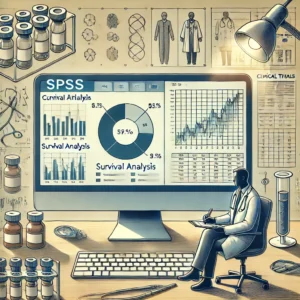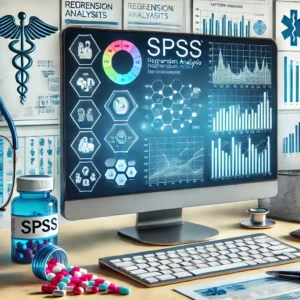Use of SPSS in Medical Science
Comprehensive Outline: Use of SPSS in Medical Science
| Main Heading | Subheadings |
|---|---|
| H1: Use of SPSS in Medical Science | – Introduction to SPSS – Key Features and Benefits of SPSS in Medical Research – Importance of Statistical Analysis in Medicine |
| H2: Applications of SPSS in Medical Research | – Clinical Trials – Epidemiology and Public Health – Biostatistics – Predictive Analytics |
| H2: How SPSS Supports Medical Data Analysis | – Data Management and Preparation – Statistical Testing Methods – Visualization and Reporting |
| H2: Advantages and Challenges of SPSS | – Benefits of SPSS in Healthcare Analytics – Limitations and Workarounds |
| H2: Real-Life Examples of SPSS in Medical Science | – Case Studies of SPSS Applications – Examples in Chronic Disease Research and Pandemic Analysis |
| H2: Training, Resources, and Future Trends | – How to Learn SPSS for Medical Science – Emerging Trends in Statistical Software for Healthcare |
Use of SPSS in Medical Science
SPSS (Statistical Package for the Social Sciences) is a powerful tool extensively utilized in medical science for data analysis and statistical evaluation. From clinical trials to epidemiology, SPSS empowers healthcare professionals and researchers to derive meaningful insights from complex datasets.
Introduction to SPSS
SPSS, developed by IBM, is designed for statistical data analysis, enabling researchers to efficiently handle large datasets and perform complex statistical tests. Its intuitive interface, versatile functionality, and robust reporting capabilities make it indispensable in medical research.
Key Features and Benefits
- User-Friendly Interface: Allows both novice and expert users to navigate complex data with ease.
- Comprehensive Tools: Includes a wide range of statistical tests, data management options, and visualization tools.
- Compatibility: Easily integrates with common medical data formats like CSV, Excel, and SQL databases.
Importance in Medical Science
Statistical analysis is central to understanding health trends, testing hypotheses, and making informed medical decisions. SPSS aids in achieving:
- Accuracy in interpreting patient outcomes.
- Effective monitoring of disease patterns.
- Evidence-based advancements in treatments.
Applications of SPSS in Medical Research
SPSS is widely applied across various domains in medical science to analyze data, identify patterns, and support decision-making.
1. Clinical Trials
Clinical trials often generate vast amounts of data. SPSS facilitates:
- Randomization of participants into treatment groups.
- Statistical tests such as t-tests, ANOVA, and regression analysis to compare outcomes.
- Longitudinal data analysis to observe treatment effects over time.
2. Epidemiology and Public Health
Epidemiologists leverage SPSS to:
- Monitor disease outbreaks and trends.

- Conduct risk factor analysis to identify causes of health conditions.
- Model disease spread, as seen during the COVID-19 pandemic.
3. Biostatistics
In biostatistics, SPSS is used for:
- Summarizing patient data with descriptive statistics (mean, median, standard deviation).
- Conducting inferential statistics to generalize findings from sample data.
- Performing survival analysis in chronic diseases and cancer research.
4. Predictive Analytics
SPSS’s predictive capabilities help in:
- Forecasting patient outcomes based on historical data.
- Identifying at-risk populations for preventive care.
- Applying machine learning algorithms for personalized medicine.
 How SPSS Supports Medical Data Analysis
How SPSS Supports Medical Data Analysis
SPSS simplifies the process of medical data analysis through its structured and user-friendly workflow.
1. Data Management and Preparation :- SPSS can import data from various sources, such as hospital records and research databases and Tools for cleaning and organizing data ensure the accuracy of analysis.
2. Statistical Testing
SPSS supports a range of statistical tests to meet different research needs:
- Descriptive Analysis: Summarizes data trends.
- Inferential Analysis: Draws conclusions about populations.
- Advanced Tests: Includes chi-square tests, logistic regression, and multivariate analysis.
3. Visualization and Reporting
- SPSS generates clear and professional graphs, charts, and tables.
- Customized reports make it easy to share findings with stakeholders.
Advantages and Challenges of SPSS
Advantages
- Reliability: SPSS produces highly accurate results essential for medical decisions.
- Efficiency: Saves time in managing and analyzing large datasets.
- Scalability: Capable of handling big data, including genomics and population studies.
Challenges
- Cost: Licensing can be expensive for small research teams.
- Learning Curve: Requires training to fully utilize advanced features.
- Predefined Tools: Limits customization compared to open-source platforms like R or Python.
Real-Life Examples of SPSS in Medical Science
SPSS has been pivotal in numerous medical studies:
- Cancer Research: Used to analyze survival rates and treatment efficacy.
- COVID-19 Analysis: Helped researchers study virus transmission and evaluate interventions.
- Chronic Disease Management: Supported studies on diabetes, hypertension, and cardiovascular conditions.
Case Study: SPSS in Vaccine Trials
During vaccine development, SPSS was utilized to analyze data from clinical trials, including efficacy rates and adverse reactions. Its ability to handle diverse datasets ensured accurate results.
Training, Resources, and Future Trends
Learning SPSS
Medical professionals can learn SPSS through:
- Online platforms such as Coursera and Udemy.
- Books like IBM SPSS for Beginners.
- Hands-on workshops focused on medical applications.
Future Trends
SPSS is evolving with advancements in technology:
- AI and Machine Learning: Integration with predictive models for personalized healthcare.
- Big Data Analytics: Enhanced capabilities for genomic and population health research.
- Cloud-Based Solutions: Increasing accessibility for collaborative research.
Frequently Asked Questions
1. What is SPSS, and why is it used in medical science?
SPSS is a statistical software used for data analysis in medical research, enabling accurate interpretation of complex datasets.
2. How does SPSS assist in clinical trials?
SPSS helps analyze data from clinical trials, comparing treatment groups and monitoring outcomes over time.
3. Is SPSS suitable for analyzing real-time patient data?
Yes, SPSS integrates with real-time data sources for timely decision-making.
4. What are the alternatives to SPSS in medical science?
Alternatives include R, Python, SAS, and Stata, each offering unique strengths.
5. Can SPSS be used for epidemiological studies?
Absolutely! SPSS is ideal for analyzing disease patterns and risk factors.
6. Where can I learn SPSS for medical applications?
Online courses, university programs, and SPSS manuals are excellent starting points.
if you want any help regarding spss Contact Us



